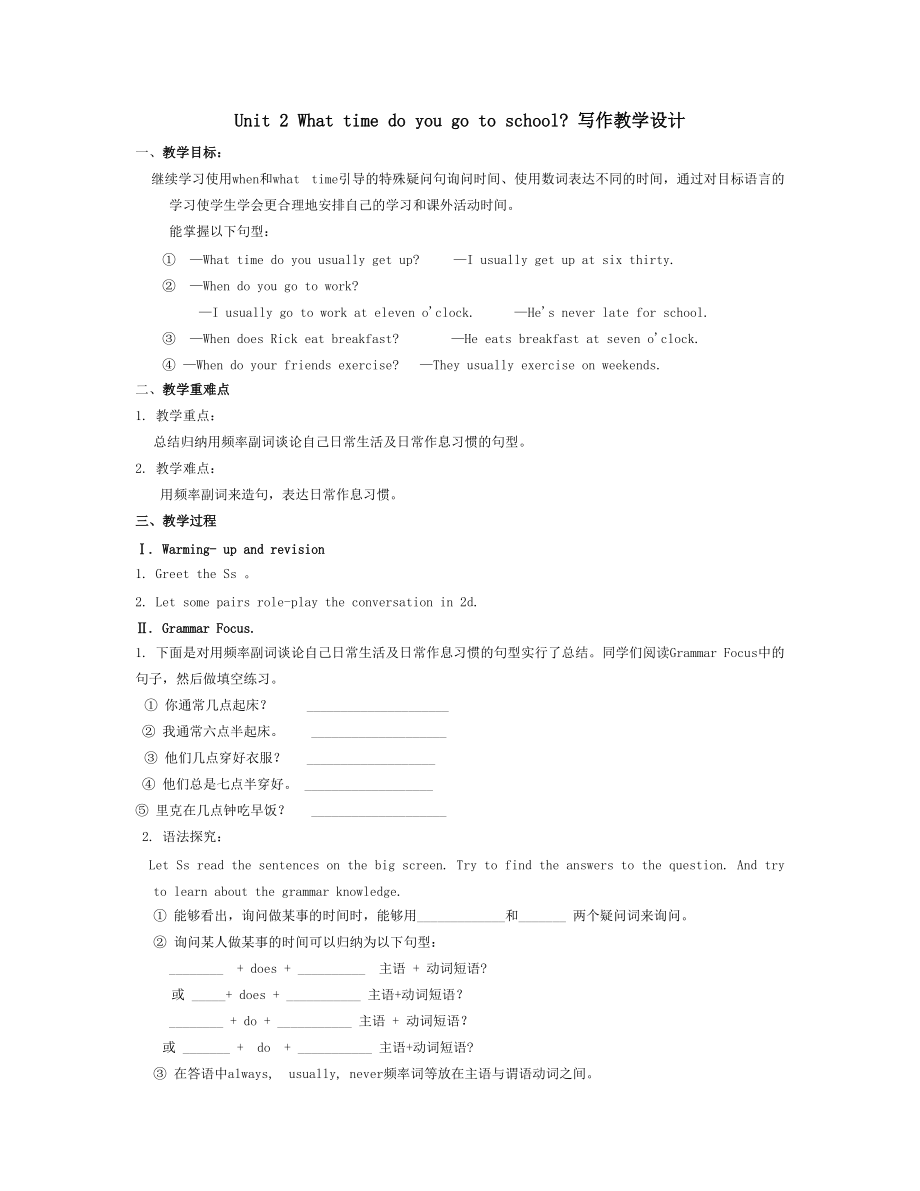《Unit 2 What time do you go to school俊 寫作教學(xué)設(shè)計(jì)》由會(huì)員分享���,可在線閱讀���,更多相關(guān)《Unit 2 What time do you go to school俊 寫作教學(xué)設(shè)計(jì)(3頁(yè)珍藏版)》請(qǐng)?jiān)谘b配圖網(wǎng)上搜索�����。
1���、
Unit 2 What time do you go to school? 寫作教學(xué)設(shè)計(jì)
一、教學(xué)目標(biāo):
繼續(xù)學(xué)習(xí)使用when和what time引導(dǎo)的特殊疑問(wèn)句詢問(wèn)時(shí)間�����、使用數(shù)詞表達(dá)不同的時(shí)間���,通過(guò)對(duì)目標(biāo)語(yǔ)言的學(xué)習(xí)使學(xué)生學(xué)會(huì)更合理地安排自己的學(xué)習(xí)和課外活動(dòng)時(shí)間。
能掌握以下句型:
① —What time do you usually get up? —I usually get up at six thirty.
② —When do you go to work?
—I usually go to work at eleven o'clock.
2����、 —He's never late for school.
③ —When does Rick eat breakfast? —He eats breakfast at seven o'clock.
④ —When do your friends exercise? —They usually exercise on weekends.
二、教學(xué)重難點(diǎn)
1. 教學(xué)重點(diǎn):
總結(jié)歸納用頻率副詞談?wù)撟约喝粘I罴叭粘W飨⒘?xí)慣的句型�。
2. 教學(xué)難點(diǎn):
用頻率副詞來(lái)造句,表達(dá)日常作息習(xí)慣�。
三����、教學(xué)過(guò)程
Ⅰ. Warming- up and revision
3��、1. Greet the Ss �。
2. Let some pairs role-play the conversation in 2d.
Ⅱ. Grammar Focus.
1. 下面是對(duì)用頻率副詞談?wù)撟约喝粘I罴叭粘W飨⒘?xí)慣的句型實(shí)行了總結(jié)。同學(xué)們閱讀Grammar Focus中的句子�,然后做填空練習(xí)。
① 你通常幾點(diǎn)起床���? _____________________
② 我通常六點(diǎn)半起床��。 ____________________
③ 他們幾點(diǎn)穿好衣服�����? ___________________
④ 他們總是七點(diǎn)半穿好�����。 ____________
4�����、_______
⑤ 里克在幾點(diǎn)鐘吃早飯�����? ____________________
2. 語(yǔ)法探究:
Let Ss read the sentences on the big screen. Try to find the answers to the question. And try to learn about the grammar knowledge.
① 能夠看出���,詢問(wèn)做某事的時(shí)間時(shí)��,能夠用_____________和_______ 兩個(gè)疑問(wèn)詞來(lái)詢問(wèn)�����。
② 詢問(wèn)某人做某事的時(shí)間可以歸納為以下句型:
________ + does + _____
5��、_____ 主語(yǔ) + 動(dòng)詞短語(yǔ)?
或 _____+ does + ___________ 主語(yǔ)+動(dòng)詞短語(yǔ)�?
________ + do + ___________ 主語(yǔ) + 動(dòng)詞短語(yǔ)���?
或 _______ + do + ___________ 主語(yǔ)+動(dòng)詞短語(yǔ)?
③ 在答語(yǔ)中always, usually, never頻率詞等放在主語(yǔ)與謂語(yǔ)動(dòng)詞之間��。
5. Check the answers with the Ss.
Ⅲ. Practice
1. Look at 3a. Tell Ss to write questions or answers
6、 with always, usually, or never.
2. 指導(dǎo):always, usually or never等副詞在句子中的位置一般是在主語(yǔ)后面���,行為動(dòng)詞前面��。要根據(jù)問(wèn)句的內(nèi)容確定答語(yǔ)的內(nèi)容�����;或者根據(jù)答語(yǔ)的內(nèi)容來(lái)確定問(wèn)句的內(nèi)容����,特別是注意問(wèn)句或答語(yǔ)的人稱或數(shù)。比如:第一個(gè)問(wèn)句所為you�,因此回答應(yīng)用第一人稱“I”; I usually get up at six thirty on school days. 其他與之相類似。
Ⅳ. Writing
1. Look at 3b. Write something you always do, something you
7��、 usually do and something your never do.
2. Ss work by themselves. Try to write down their own sentences.
3. Let Ss exchange their sentences with their partners. Check each other's answers.
4. Let some Ss read their sentences aloud to their classmates.
Ⅴ. Interview
1. Look at the box belo
8���、w. Ask a student read aloud the phrases. Now, interview three of your classmates. Find out what time they do these activities. Then give a report to the class.
?
Jenny
S2
S3
get up
7:00
?
?
exercise
8:00
?
?
eat dinner
6:30
?
?
take a shower
9:00
?
?
go to school
7:30
?
?
9����、2. First, ask and answer your friend:
You: What time do you usually get up?
Jenny: I usually get up at 7:00.
You: What time do you exercise?
Jenny: I usually exercise at eight.
You: What time do you usually eat dinner?
Jenny: I usually eat dinner at 6:30.
You: When do you usually take a showe
10�、r?
Jenny: I usually take a shower at 9:00.
…
3. Then write a report in your exercise book:
(提示:讓學(xué)生們一定要注意正確運(yùn)用動(dòng)詞的第三人稱單數(shù)形式。)
In our group, Jenny usually gets up late on weekends. She gets up at seven o’clock. She always exercises at eight o’clock. She usually eats dinner at six thirty. She usua
11����、lly takes a shower at nine o’clock. She usually goes to school at seven thirty on school days.
4. Let some Ss read their report to the class.
Homework
1. Read the sentences in Grammar Focus.
2. Ask your family member about their daily arrangement. Then write a report.
板書設(shè)計(jì)
Section A
12、Grammar Focus-3c
3a: 1. I usually get up at 6:30 on schooldays. 2. What time does Rick get up?
3. I usually have breakfast at 7:00. 4. What time does Anna eat breakfast?
5. He always go to school at 7:40.
3b: always: I always get dressed at 6:40.
usually: My brother usually take s
13�、hower at 9:00.
never: My sister never late for school.
3c. In our group, Jenny usually gets up late on weekends. She gets up at seven o’clock. She always exercises at eight o’clock. She usually eats dinner at six thirty. She usually takes a shower at nine o’clock. She usually goes to school at seven thirty on school days.
 Unit 2 What time do you go to school俊 寫作教學(xué)設(shè)計(jì)
Unit 2 What time do you go to school俊 寫作教學(xué)設(shè)計(jì)

